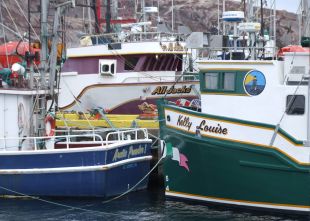Fisheries talks raise alarm

The Telegram | May 29, 2013
Fisheries talks raise alarm
But FFAW cautiously optimistic about free trade negotiations
James McLeod
Opposition politicians in Newfoundland and in Ottawa are expressing concern about potential fisheries industry giveaways at the negotiating table on Canada-Europe free trade talks, but the province’s fisheries union said Tuesday that fewer trade barriers would be a good thing.
On Monday, Premier Kathy Dunderdale said Prime Minister Stephen Harper tried to strongarm her by deregulating the province’s processing sector in exchange for a loan guarantee on Muskrat Falls.
Dunderdale said she wouldn’t agree to any sort of “quid pro quo” but she said when it comes to the Comprehensive Economic and Trade Agreement (CETA) with Europe, everything is on the table during negotiations in Brussels.
Fish, Food and Allied Workers union president Earle McCurdy said if the province has to bend on minimum processing requirements in the province, that may be alright as long as Europe drops trade restrictions.
“The European Union is the most important seafood market in the world, potentially,” McCurdy said. “We are at a considerable competitive disadvantage in trading with the EU.”
For example, he said codfish faces a 7.5 per cent tariff coming from Canada, and it’s competing against Iceland and Norway cod which has no tariff. He said that shrimp from this province faces “end-use restrictions” which basically mean it can only be sold in bulk going into the EU, which eliminates any chance to do branding or value-added processing.
“Progress in those areas would be very significant for our industry,” McCurdy said.
But opposition politicians worry that without minimum processing rules, plant workers’ jobs would be in jeopardy.
“I have a real concern that the premier would sort of think it’s alright to have the minimum processing requirements on the table,” New Democrat Leader Lorraine Michael said. “I think the principle of minimum processing requirements is the only way that we get some value-added work for our workers in the industry here in Newfoundland and Labrador.”
Similarly, Liberal Fisheries critic Jim Bennett worried that without minimum processing regulations, workers in this province wouldn’t see any benefit from the fisheries resource.
“Ten thousand people are employed in processing in the province. The fishery is still the biggest employer,” Bennett said. “If you look at what happens in New Zealand right now, much of the fishing is done offshore in factory freezer trawlers and the New Zealanders get nothing.”
In Ottawa, opposition politicians fretted over the secrecy surrounding the CETA talks that are going on. On Monday, Dunderdale said she expects the negotiations to wrap up within the next two weeks, but New Democrat MP Jack Harris said he’s still not clear what’s even being negotiated. “Our problem is all of this stuff has been kept in the dark,” Harris said. “We’re going to be stuck with something afterwards, presented by the Government of Canada as all or nothing.”
Liberal MP Scott Andrews said he’s hopeful that the CETA deal could be good for Newfoundland and Labrador, but without any information, he doesn’t know what to expect.
“I’m very concerned where these CETA negotiations are going. They’re being done in secret,” he said. “I would like to know what they’re going to do with the shrimp tariffs. The shrimp tariffs going into the EU has been a huge sticking point for Newfoundlanders for some time.”
In an effort to shed some light on what’s actually happening at the CETA negotiating table, The Telegram requested an interview with federal International Trade Minister Ed Fast. He refused to do an interview, but a spokesman provided a statement on his behalf.
“We continue to work collaboratively with Newfoundland & Labrador, to protect and create jobs in the province, and to ensure that all Newfoundlanders & Labradorians continue to benefit from the province’s world-class resources,” Fast said in the e-mailed statement. “We are committed to achieving an outcome that is in the best interests of Canadians, and opens up new opportunities for Canada’s exporters.”
Fisheries Minister Derrick Dalley was at a media event in St. John’s Tuesday, where he assured reporters that the provincial government is not going to give away minimum processing requirements unless it’s a good deal.
“There’s an ongoing negotiation and we want to achieve the zero tariff and no end use restriction immediately, but we’re certainly not prepared at all cost,” he said. “I can’t stress enough that we fully intend to maintain our jurisdictional right and responsibility to maximize the value of our resources for the people of Newfoundland and Labrador.”
Dalley said he’s consulting with people in the fishery on what sort of deals they make in Europe, but he wouldn’t say who he’s speaking to.
“I won’t provide all the details today because, again, negotiations are ongoing,” he said. “Suffice it to say, we’re not going this alone. It’s important that we engage the people that are directly involved in the industry.”





